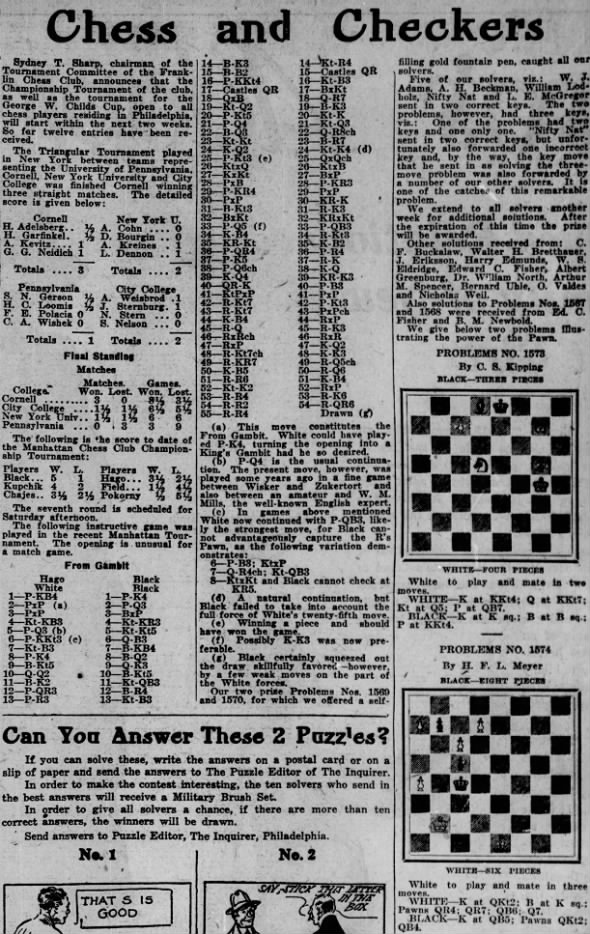 Chess and Checkers 11 Jan 1920, Sun The Philadelphia Inquirer (Philadelphia, Pennsylvania) Newspapers.com
Chess and Checkers 11 Jan 1920, Sun The Philadelphia Inquirer (Philadelphia, Pennsylvania) Newspapers.com
The follow is the score to date of the Manhattan Chess Club Championship Tournament.
The seventh round is scheduled for Saturday afternoon.
The following instructive game was played in the recent Manhattan Tournament. The opening is unusual for a match game.
Martin Desire Hago vs Roy Turnbull Black
Manhattan CC Championship (1919), New York, NY, rd 3, Dec-20
Bird Opening: From Gambit (A02) 1/2-1/2
(a) This move constitutes the From Gambit. White could have played P-K4, turning the opening into a King's Gambit had he so desired.
(b) P-Q4 is the usual continuation. The present move, however, was played some years ago in a fine game between Wisker and Zukertort and also between an amateur and W.M. Mills, the well-known English expert.
(c) In games above mentioned White now continued with P-QB3, like the strongest move, for Black cannot advantageously capture the R's Pawn, as the following variation demonstrates:
6— P-B3; KtxP
7— Q-R4ch; Kt-QB3
8—KtxKt and Black cannot check at KR5.
(d) A natural continuation, but Black failed to take into account the full force of White's twenty-fifth move.
(e) Winning a piece and should have won the game.
(f) Possibly K-K3 was now preferable.
(g) Black certainly squeezed ot the draw skillfully favored—however, by a few weak moves on the part of the White forces.
Chess and Checkers Sun, Jan 11, 1920 The Philadelphia Inquirer (Philadelphia, Pennsylvania) Problem No. 1573, by C.S....
Posted by Bobby Fischer's True History on Thursday, January 23, 2020
Problem No. 1573, by C.S. Kipping. Black Three Pieces. White Four Pieces. White to play and mate in two moves.
FEN 3bk3/2P3Q1/8/3N2p1/6K1/8/8/8 w - - 0 1
Solution: 1. c8=B Bc7 2. Qe7#
Chess and Checkers Sun, Jan 11, 1920 The Philadelphia Inquirer (Philadelphia, Pennsylvania) Problem No. 1574 by H.F.K....
Posted by Bobby Fischer's True History on Thursday, January 23, 2020
Problem No. 1574 by H.F.K. Meyer, Black Eight Pieces, White Six Pieces.
White to play and mate in three moves.
FEN 8/Pp1P4/2P5/2p5/P1k5/8/1K6/4B3 w - - 0 1
Solution: 1. d8=R bxc6 2. Rd2 Kb4 3. Rd4#






















